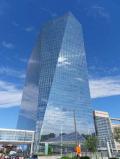Founded in 1949, Baker & McKenzie actually began when Russell Baker opened his practice in 1925, after graduating from the University of Chicago School of Law. Baker, though born in Wisconsin, was raised in New Mexico. From an early age he was exposed to the Spanish language and other cultures. The earliest firm, Baker & Simpson, provided legal services to Chicago's growing Mexican American community. The firm soon positioned itself to advise US companies investing in Latin America.
Abbott Laboratories became a chief client in 1934 as it expanded overseas. In 1949, the firm re-launched with John McKenzie, an experienced litigator who had graduated from Loyola University Chicago School of Law. McKenzie took charge of the flourishing litigation practice, and Baker was able to devote his energies to building an international practice. Through the 1950s, the firm's clients grew to include Eli Lilly and Company, G. D. Searle & Company, Wm. Wrigley Jr. Company and Honeywell.
In 1955, the firm became international when a lawyer in Venezuela contacted Baker & McKenzie about opening a joint venture office in Caracas. Donald Baker, the name partner's son, soon moved to Caracas to launch a practice for the firm. In the next three years, the firm established offices in Washington, D.C., Brussels, Zurich, New York and São Paulo.
Unlike other American firms that often practiced U.S. law abroad, Baker & McKenzie made a decision to train local lawyers, often bringing them to the Chicago base for an initial period or temporarily relocating U.S. attorneys to the foreign office to oversee the establishment of the practice. By 1978 Baker & McKenzie had 26 offices in 20 countries.
In 1986, the firm established offices in Northern Mexico to facilitate legal transactions connected to industrial development in that region. Baker & McKenzie was one of the first firms to establish offices in the East after the Iron Curtain fell. Further, the firm merged with MacDonald, Halsted, and Laybourne to start offices in Los Angeles and San Diego. By 1990, the firm operated nearly 50 offices on 6 continents, employed nearly 1,500 attorneys, and generated over $400 million in revenues.
In 1999, the firm celebrated its 50th anniversary. That same year, Christine Lagarde - then-Paris managing partner and an antitrust and labor lawyer - was elected Chairman of the Global Executive Committee, the first woman to lead Baker & McKenzie. She was Chairman for five years. In 2004, Forbes listed Lagarde as No. 76 in its list of “Most Powerful Women in the World."
In 2001, the firm employed nearly 3,000 attorneys and had $2 billion in revenues. Baker & McKenzie adopted a Swiss Verein structure on July 1, 2004. In 2005, the firm received a large boost when nearly 70 partners and other legal staff from the New York office of the disbanding international firm Coudert Brothers joined Baker & McKenzie.
In October 2006, Unilever chose the firm to manage its global trademark portfolio, the largest in the world with over 160,000 registrations. It was the first time a multinational company outsourced its trademark management to a law firm on such a large scale.
In October 2010, the firm both opened an office in Luxembourg, its 68th office worldwide, and Eduardo Leite was elected Chairman. He is the Firm's first chairman from Latin America.
In 2006, Baker & McKenzie wrote the amicus brief of the Council of Parent Attorneys & Advocates (COPAA) in support of the petition for a writ of certiorari in Winkelman v. Parma City School District, and later, COPAA's amicus brief on the merits. It argued that parents have the right to represent themselves in court to enforce their IDEA rights and protect their children's access to a free appropriate public education. This led to a unanimous Supreme Court decision in June 2007 granting parents the right to proceed without counsel on behalf of children with disabilities.
In 2007, the firm advised American Standard on the $1.7 billion sale of its bath and kitchen products business and the wider separation of the company’s operations. Completion of the deal involved 600 of the firm’s lawyers spread over 40 offices.
In 2007, Baker & McKenzie LLP acted as U.S. counsel for the Gas Natural Group in a $1.4 billion energy acquisition, the largest mergers and acquisitions deal in Mexico in 2007. The transaction represented the entry of the Spanish energy multinational into the Mexican electricity generation business as the second largest private operator, making Gas Natural the only operator of both gas and electricity in Mexico.
In 2010, the firm advised Bemis Company Inc. on the acquisition of the Food Americas division of Alcan Packaging Inc., a business unit of Rio Tinto plc, for $1.2 billion. The deal included the acquisition of 23 facilities in the US, Canada, Mexico, Brazil, Argentina and New Zealand and involved a Baker & McKenzie team of lawyers from Chicago, London, Monterrey, São Paulo and Toronto.
Baker & McKenzie has been the recipient of countless awards over the years. Some of these include being named No. 1 in PLC Which Lawyer?’s Global 50 each of the past five years; Asia Law Firm of the Year, 2005–2009; Latin America Law Firm of the Year, three of the past five years; Middle East Law Firm of the Year, 2008 and 2009; Central & Eastern Europe Law Firm of the Year, 2008, and in 2010, was the recipient of the first Corporate Pro Bono Partnering Award from the Pro Bono Institute. In addition, the firm was recognized in 2008 for the second year in a row by Working Mother magazine as one of the Best Law Firms for Women.
Also, since 2005, Baker & McKenzie has been one of seven law firms who are members of Diversity Champions, a 'good practices' program for blue-chip and major public sector employers. Diversity Champions is an effort of Stonewall, a UK-based lobbying group dedicated to the rights of lesbians, gay men and bisexuals.
In November 2010, Baker & McKenzie announced the publication of Pro Bono Service by In-House Counsel: Strategies and Perspectives, a first-of-its-kind book designed to provide in-house counsel with best practices for developing in-house pro bono efforts. Baker & McKenzie’s Global CSR Program is based on three pillars of pro bono and community service; diversity and inclusion; and sustainability. The Firm’s involvement in Pro Bono Service by In-House Counsel: Strategies and Perspectives is a hallmark of its longstanding commitment to responsible corporate citizenship.
Baker & McKenzie offers its clients and its people the uncompromising commitment to excellence expected of a top firm and a distinctive way of thinking, working and behaving, as a passionately global and genuinely collaborative firm. The firm has more leading lawyers in more countries in the Chambers Global Directory than any other global Top 20 law firm. Chambers lists 19 of the firm’s practices in its global rankings of the world’s leading practices.





